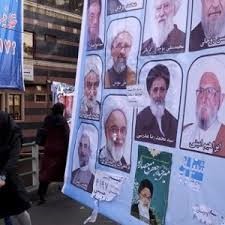

| Online: | |
| Visits: | |
| Stories: |
Iran “elections”: What to expect or not to

BY Amir Basiri
International mainstream media, especially those in the West, are carried away in a mistaken hype over results and expectations from the recent “elections” in Iran. Illustrating the outcome of these polls through an ideal, Western- style point of view oversimplifies the complexities found in Iran’s political establishment. Getting too excited about these elections rendering a more open Iran to the outside world would be naïve. Unfortunately, there will be no real change from within the ruling elite in Iran, and such an expectation would be a grave faux pas.
The “All Mighty” Assembly of Experts
This council-like body gathers 88 mullahs supposedly elected through a voting process. Each candidate is carefully vetted through a rigorous process orchestrated by the Guardian Council, another roundtable of 12 mullahs all are directly or indirectly appointed by the supreme leader, now Ali Khamenei.
Feeling in debt, the Guardian Council is a safeguard mechanism to ensure Khamenei’s policies and agendas advance. This body is known to sack any candidate whose devotion to the nezam – the system – is in any doubt, whose political and religious ideals may in any way differ from that of the senior brass, and whose perspectives are not completely in line with that of Khamenei. To make it simple, if the supreme doesn’t like you, don’t waste your time.
The task of the Assembly of Experts is to select the supreme leader in Iran, meaning waiting until the sitting leader either dies or steps down for some reason. These elections are held every 8 years, this body has been idle for the past 28 years. However, assuming this body actually appoints the next supreme leader is far from reality. It’s far more complicated.
After Khamenei sat on the thrown, his first actions was to marginalize and literally eliminate a number of influential mullahs who enjoyed significant authority. These figures were considered rivals whom Khamenei could not tolerate. The Guardian Council only permits hardline mullahs from all walks of life who have proven their diehard loyalty to Khamenei, along with senior elite of the notorious Revolutionary Guards (IRGC), to take part in the Assembly of Experts elections. Owing their all to Khamenei, there has never been a single case where this body has actually dared to question the supreme leader.
The Assembly of Experts has only once been called upon to perform its duty back in 1989. After merely a few hours the entire Assembly crowned Khamenei as their “king”. Why so easy? Behind the scenes the IRGC had groomed Khamenei as a shoe-in for the leading post. The Assembly of Experts gave a green light to Khamenei only after the IRGC gave him a thumbs up. When Khamenei finally dies, rest assured the IRGC will again seek to play a decisive role.
The Majis, Iran’s version of a parliament
This is a fairly symbolic body since throughout the lifespan of this regime its “representatives” have always sought Khamenei’s viewpoint as guide to cast their votes for significant bills. This included matters regarding the recent nuclear pact, pouring billions of dollars into the Syria inferno, providing even more for their military and security apparatus, and …
One clear example was the nuclear agreement. Despite hardliners controlling parliament, they refused to hinder their rivals’ efforts to approve the nuclear deal. They approved, knowing Khamenei and senior IRGC officials would definitely confirm as they sought relief from crippling economic sanctions. The truth is the supreme leader and the IRGC elite were setting the stage for a deal with the international community, led by the United States.
All candidates for this body also need the Guardian Council’s blessing. During the late 1990s and early 2000s, Khamenei allowed so-called reformists gain control of the parliament in an attempt to deceive the West (a plan that worked but in itself is a long story). However, the IRGC quickly took action, banning dozens of newspapers and throwing behind bars many members of the “reformist” mantra. The message was clear: any agenda failing to fall in line with Khamenei was unacceptable.
Will these elections render change?
No. The sheer analysis of these twin “elections” have been subject to misconceptions, hype, political polemics, lack of knowledge and oversimplifications. Unfortunately, the main item missing is very necessary scholarly work. Looking beyond the surface is crucial here. Only then can we realize that the IRGC empire and the supreme leader have the final world on all political and economic matters. The IRGC, an offspring of Iranian regime founder Ruhollah Khamenei, rose to its current status quo thanks to Khamenei. This pair literally control all major aspects of life in the country we call the Islamic Republic of Iran.
We should not fall for the illusion of Iran’s elections appearing competitive and democratic. This would be playing into the mullahs’ hands. A selected powerful few behind closed doors make the final decisions and control the entire framework behind “elections” in Iran. Thus, expecting Iran’s domestic and foreign policies to undergo fundamental change is dreaming far from reality.
Basiri is an Iranian human rights activist and supporter of democratic regime change in Iran. Follow him on Twitter: @Amir_bas



